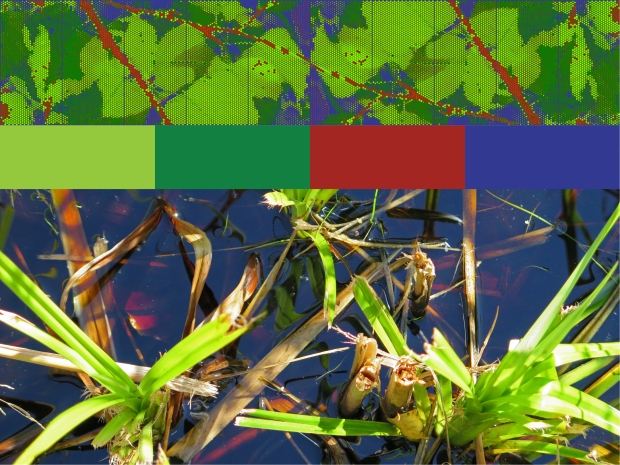South Bellevue Station: Acoustic Panel Colors
The South Bellevue Station’s largest art statement is the six-foot tall acoustic barrier along the guideway. This barrier is several hundred feet long and helps mitigate the sound of the trains. It is a long expanse that we have treated as a pattern ribbon with a design inspired by the vegetation of the nearby wetland, the Mercer Slough, as can be seen in an early image below.

The acoustic panels, patterned with a leaf pattern inspired by the slough, as seen in this before and after, transform the guideway.
The acoustic panels transition color across across the length of the guideway inspired by the color of the foliage at the site, throughout the seasons. A system of seven templates tracks the changing colors and adds interest to the full span of the station.
The first template, above, uses two layers, a gray background and a dark blue layer, to create the subtle patterning associated with shadows cast by leaves and branches. The second template, below, adds a third layer of green, gradually building color and pattern to the span. This green helps soften the guideway, relating back to the vegetation of the slough.
The third template, above, adds a fourth, light green, layer and changes the background from gray to a royal blue. This completes the pattern adding a richness of definition and color. This is the full expression of the pattern. The fourth template, below, changes the dark blue to dark red, while maintaining the pattern. This subtle shift prepares the pattern to move from spring to summer colors.
The fifth template, above, changes the dark green into orange. This is a dramatic change reminiscent of the change of seasons from summer to autumn. Changing one color on one layer, while maintaining all the other colors and the larger pattern makes a significant difference. The sixth template, below, changes the royal blue background to a purple-violet and changes the light green to yellow. These changes give the full burst of autumn colors to the span at the center of the platform.
Template 7, above, swaps the yellow for light green again, allowing the pattern to transition back to more greens and blues. The templates repeat many times across the span to make up its full length. Their progression can be seen in this simplified diagram, below. The templates make smooth transitions into each other by adding and swapping colors to make a unified dynamic expression across the length of the guideway.
Team Credits:
Alexandr Polzin
Client:







